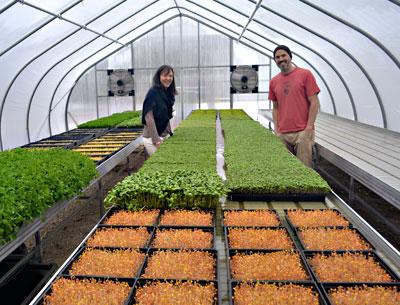Big Plans for Tiny Greens

The idea sprouted two summers ago in his Amagansett backyard with a seed planted by his ex-girlfriend, and now Brendan Davison grows certified organic microgreens at his Good Water Farms in East Hampton and hand-delivers trays of them to top-notch restaurants on the East End and in New York.
The chefs cut the two-week-old infant greens while they are still alive in the soil from which they grew, so they’re receiving nutrients until minutes before they are eaten. An essential ingredient in Mr. Davison’s “modern boutique farm” is his inclination to “question everything,” he said — an impulse that once got him kicked out of Sunday school. Farming experience in California helped too, as did his study of shamanism.
With the help of Marsha LaTessa, a “kindred spirit,” Good Water Farms is preparing for a major growth spurt.
At the 1,800-square-foot “indoor farm,” there is a warm and steamy seed germination room, where life begins before the seedling trays are moved to tables below full-spectrum indoor lighting. From there, they’re moved to a 20-by-40-foot greenhouse just outside the building on Plank Road. The seedlings are watered from below with reservoirs beneath the long, stainless steel tables.
“It’s not hydroponic,” Mr. Davison explained, because hydroponically grown plants require chemicals. For his microgreens, he said, soil is not only necessary, it’s “the most important thing.” Only certified organic soil from Vermont, which contains an abundance of nutrients including essential minerals, is used.
Living soil is sacred and people should nourish themselves with a product of it, he said. “We are no different from these plants.” Before Christianity, shamans and pagans worshipped the earth, he said. “To plant a seed . . . this is creating life,” he said.
A plant’s life progresses from seed to sprout to microgreen, petit green, and baby green before it is full-grown. The first leaves are four to six times more nutritious than mature leaves, Ms. LaTessa and Mr. Davison said.
Locally, Good Water Farms microgreens can be found in a plastic “clamshell” in the produce section with a 10-day shelf life, or atop salads in the cafe at Provisions in Sag Harbor. They are also sold at the Amagansett IGA, Schmidt’s Market in Southampton, and Naturally Good in Montauk.
The Topping Rose House, the restaurant helmed by Tom Colicchio, and Almond, both in Bridgehampton, and Sen in Sag Harbor serve Good Water Farms microgreens. In the summer, Surf Lodge and South Edison in Montauk are customers.
Some customers purchase them through Rustic Roots, an organic home-delivery service, which offers seasonal varieties such as this week’s kale, sunflower, pea tendrils, broccoli, and arugula. The company collects fresh farm products with a goal of delivering within 24 hours.
Mr. Davison said that the tiny greens can be used in and on salads, in soups, sandwiches, and wraps, in smoothies, or alone as a snack. His 9-year-old daughter likes greens on her pizza, recently asking, “Papa, can we sneak in some greens,” before going into a brick oven pizzeria. Because they’re sweeter than a full-grown vegetable, “microgreens could be the reason kids eat vegetables again,” he suggested. His daughter especially loves the pea tendrils, arugula, and sunflower greens, he said.
Jason Weiner, the chef at Almond restaurants, pairs Good Water Farms micro opal basil with local tomatoes in the summer. Recently, he added micro arugula to a bay scallop dish with Old Bay hollandaise and house-smoked bacon. “I use his stuff in all three of our places,” Mr. Weiner said. “It adds life to everything I use it on.” He appreciates the “boutique operation that grows in real dirt. . . . Imagine that.”
“Brendan’s a great guy and his product is quite simply fantastic,” said Mr. Weiner, “and the best part . . . he’s about as local as you can get . . . our kids go to the same school.”
“Many times Brendan will grow microgreens specifically for one of our dishes based on the flavor profiles we are looking for,” said Landy F. Labadie, the director of food and beverage for the Topping Rose House. Sunday’s menu included two appetizers with Good Water Farms microgreens — one with pea shoots combined with brulée orange, honey, walnuts, and calamata olives, she said. The restaurant also uses red shiso, sunflower, micro wasabi, micro lemon basil, baby cabbage, and baby broccoli from Mr. Davison and Ms. LaTessa’s farm.
The farm’s focus is on culinary excellence and nutrition, said Ms. LaTessa, “how clean we want our food to be for us, our retailers, our restaurants. . . . It is a lifestyle and a philosophy.” It starts with the seed sourced from reputable companies. “We would never touch anything genetically modified.” The company won’t even use corn-based compostable packaging because so much corn is genetically engineered.
“Large-scale factory farming is the reason people get sick,” Mr. Davison said. Besides the sprayed chemicals, the percentage of available nutrients is minimal, he explained.
It is a progressive way to think about food and business, said Mr. Davison, it’s “conscious capitalism.”
